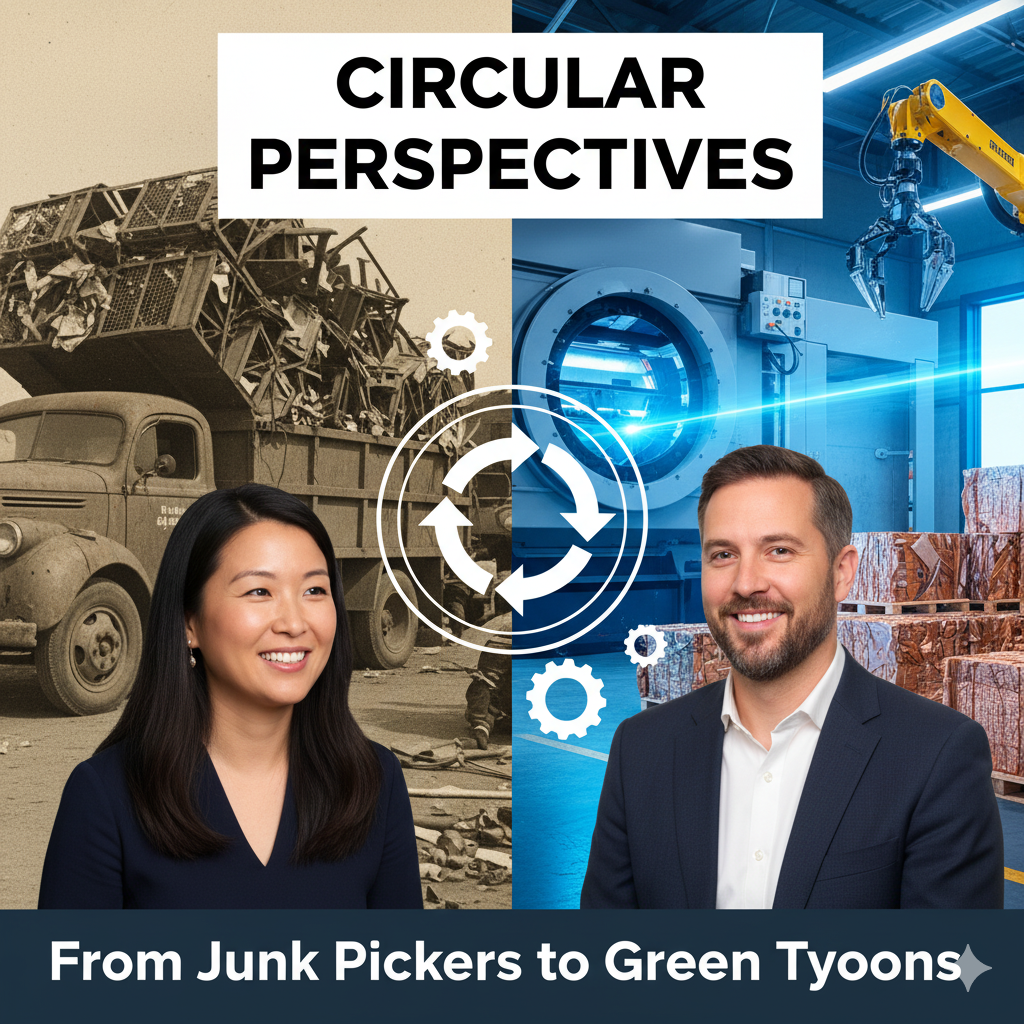From Junk Pickers to Green Tycoons: The Rise of Scrap Metal Recycling

Host (Maria): Welcome back to "Circular Perspectives," the podcast where we dig into the unsung heroes and the unexpected opportunities of the circular economy. I'm your host, Maria Chen. And today, we're tackling a fascinating transformation: the scrap metal industry. Once perceived as, let's be frank, a bit of a gritty, back-alley operation, it's now a powerhouse of sustainability and profit.
Co-host (David): Absolutely, Maria. And joining me today is David 'The Dig' Miller, my co-host, ready to unearth some truths about this often-misunderstood sector.
Maria: David, you've been around this industry, in various capacities, for a while. Let's start with that perception. What was 'scrap' like, say, a few decades ago? What was the general public's view of a 'junk man' or a 'metal collector'?
David: Oh, the "junk man." (chuckles) That phrase itself tells you everything, doesn't it? It conjures images of an old pickup truck rattling down the street, probably overflowing, maybe a bit rusty, and definitely making a racket. The public saw it as a last-resort hustle. It was a trade for those who didn't have many other options, often associated with poverty, sometimes even seen as a nuisance. There wasn't a lot of respect, and certainly not a lot of understanding of the economic or environmental value.
Maria: And politically, I imagine it wasn't exactly a priority for environmental regulations or economic development boards.
David: Not at all! The focus was largely on manufacturing, on virgin material extraction. Recycling, especially scrap metal, was sort of this necessary evil, a byproduct that had to be dealt with, but not celebrated. Yards were often seen as eyesores, contributing to pollution, definitely not a place for innovation or serious investment.
Maria: So, what changed? What sparked this massive shift from 'frowned upon' to what many now recognize as a sophisticated, lucrative, and absolutely essential business?
David: I think it was a perfect storm of factors, really. First, environmental awareness exploded. Suddenly, landfills were overflowing, and people started understanding the finite nature of resources. The energy savings from recycling metal – what, 70-90% less energy than mining and processing virgin ore? – became a huge talking point. That narrative shifted from 'getting rid of junk' to 'resource conservation.'
Maria: So, the public perception started to turn, driven by a greener conscience.
David: Exactly. And then, technology caught up. We went from mostly manual sorting to incredible advancements. Think about it: Eddy Current Separators to separate non-ferrous, then XRF guns for precise alloy identification, then AI-powered optical sorters, robots even! What used to take hours of manual labor, or was simply impossible to separate effectively, became automated and hyper-efficient. This elevated the quality of the recycled product, making it far more attractive to manufacturers.
Maria: Which, of course, ties into the economic driver. As the quality improved, and the environmental benefits became undeniable, manufacturers began seeing recycled content not just as cheap filler, but as a premium, sustainable input.
David: Precisely. And global demand for metals just kept soaring, especially with the rise of industrialization in Asia. Virgin extraction became more expensive, more environmentally damaging, and often politically complex. Recycled metal offered a stable, domestic, and greener alternative. This created massive profit opportunities, attracting serious investment, better management, and a new generation of entrepreneurs.
Maria: So, we're talking about sophisticated businesses now. Digital Yard Management Systems, complex logistics, hedging against commodity price fluctuations...
David: Absolutely! We're seeing businesses integrating advanced analytics, drone technology for inventory, and even venturing into cutting-edge areas like EV battery recycling. The 'junk man' of yesterday is now a logistics expert, a commodity trader, an environmental compliance officer, and a tech innovator, all rolled into one. It's a highly competitive, data-driven, and capital-intensive industry.
Maria: It really is remarkable. So for someone looking at this industry today, perhaps a young entrepreneur, what's the key takeaway about its modern status?
David: The key takeaway is that scrap metal recycling is no longer just a hustle; it's a vital component of the global economy and a critical pillar of sustainability. It's a challenging business, but for those who embrace technology, prioritize compliance, understand market dynamics, and build strong relationships, it offers immense potential for wealth creation and genuine positive impact. It’s a green industry that’s truly lucrative. The grunt work is still there, but the strategic layer on top has made it a respected and powerful force.
Maria: "From Junk Pickers to Green Tycoons"—that sums it up perfectly. David, thank you for those insights.
David: Always a pleasure, Maria.
Maria: And to our listeners, thank you for joining us on Circular Perspectives. We'll be back next time to dig deeper into another fascinating corner of the circular economy. Until then, keep an eye out for those hidden treasures!
- Art
- Causes
- Crafts
- Dance
- Drinks
- Film
- Fitness
- Food
- Oyunlar
- Gardening
- Health
- Home
- Literature
- Music
- Networking
- Other
- Party
- Religion
- Shopping
- Sports
- Theater
- Wellness



